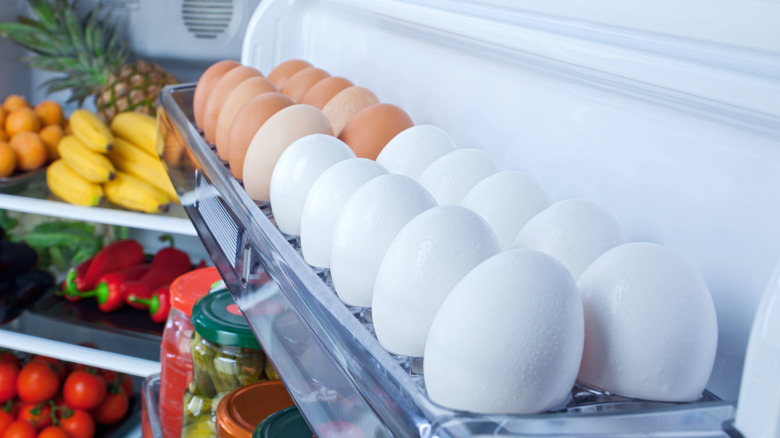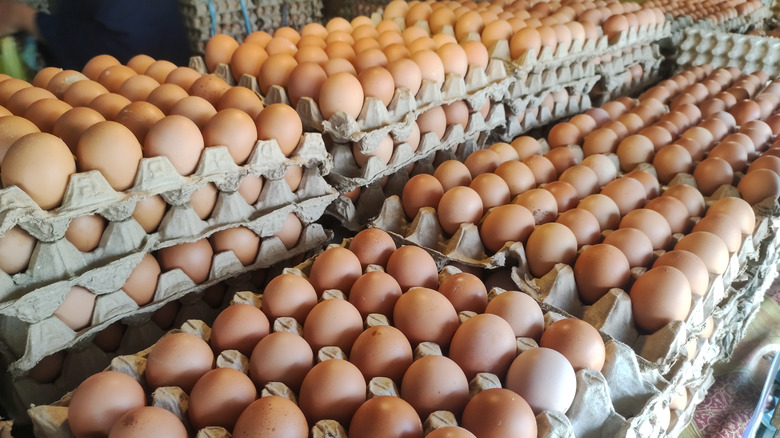How Long Do Eggs Really Last In The Refrigerator?
Whether it's an omelet at breakfast or a fried egg over ramen for dinner, eggs are an integral part of many people's diets. But as nutritious and versatile as they are, they do have a downside — when they go bad, they can stink up your entire kitchen. Even worse, according to WebMD, rotten eggs can harbor E. coli, and ingesting one may lead to fever and serious gastrointestinal issues. For these reasons, and because it is a shame for good eggs to go to waste, it pays to know the shelf life of eggs. Luckily, when stored in the refrigerator, eggs can last for a surprisingly long time.
According to the USDA, refrigerated eggs will keep for up to three to five weeks. In fact, older eggs are better if you want to hard boil them. A carton of eggs may go past the sell-by date on their packaging within that time period, but a product's sell-by date does not indicate when that product expires. Instead, it is an instruction to the grocery store of when that product should be taken off the shelves. The five-week time limit only applies to whole eggs still in their shells. As long as you purchased the eggs before the sell-by date, they should stay good for quite a while.
How to store eggs so they'll last
To keep your eggs fresh for as long as possible, make sure to store them on a shelf near the back of the refrigerator. If you keep them in the refrigerator door, they may become damaged and lose their freshness more quickly since they'll be exposed more often to warm air. You could also freeze eggs, either whole or cracked into a sealed container; frozen eggs will keep for up to a year.
The five-week timeline only applies to commercially regulated eggs stored in the refrigerator. If kept at room temperature, a carton of eggs can start developing bacteria in as little as two hours. That's because, in the U.S., eggs go through a cleaning and sanitization process before they reach stores that wash away the egg's natural protective barrier (eggs in the U.K. actually don't have to be refrigerated). However, if you're able to get eggs straight from a farm and don't refrigerate them, the eggs can stay out for two weeks at room temperature; this is the norm for eggs in many other countries. The lengthy shelf life also only applies to whole eggs still in their shells; cooked and deshelled eggs don't last nearly as long in the refrigerator.
How long eggs last out of their shell
An egg's long shelf life goes out the window as soon as the contents are freed from the protective shell. Once cooked, eggs don't stay fresh for nearly as long and may go bad faster or slower depending on how they are used. For example, the FDA says that egg dishes like quiche, scrambled eggs, or omelets shouldn't be eaten after more than four days in the refrigerator. Hard-boiled eggs, on the other hand, can last in the fridge for up to a week. The numbers are also different for raw egg parts that you might have left over after baking. If you need to store uncooked eggs without their shell, like raw scrambled eggs or separated yolks or whites, keep them in an airtight container and use them up within 2-4 days.
We owe a lot to eggshells. These sturdy spheres of calcium are somewhat miraculous and keep eggs viable for long enough that there's little chance of any going to waste. Eggs may last over a month in the refrigerator, but considering how much we use them, it's unlikely they'll need to sit around that long.
How to tell if an egg has gone bad
Whether it's by sight or smell, a rotten egg usually makes itself known, so there's little need to worry about accidentally ingesting one. Before you crack into any egg, even one that you just bought, it's always a good idea to give it a once-over to check for any cracks or signs of mold. A damaged egg should be discarded since there's a chance bacteria may have made it past the shell. If you're still unsure of an egg's freshness and don't want to break it preemptively, you can try the float test. While this test can't tell you whether the egg is spoiled, it can tell you how old it is, which can help you make a better guess about the egg's quality. If you still aren't sure, you may want to crack the egg into a separate bowl so that it if it is rotten, nothing yucky mixes with fresh eggs or other ingredients.
Once the egg has been transferred to its own bowl, you should be able to give it an even more thorough inspection. At this point, a truly rotten egg will be infiltrating your nostrils with its telltale odor. Even if it's not super pungent, any bad smell is a sign that an egg has gone off. Also examine the egg white and yolk for discoloration. Egg whites that are especially runny or shiny are a sure sign of spoilage.



